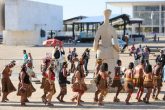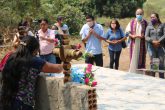Newsletter No 899 – Belo Monte: “There was no dialogue”
The president of the Indigenist Missionary Council (CIMI), Bishop of the Xingu Prelature, Dom Erwin Kräutler and one of the leaders of the fight agains the Belo Monte Hydroelectric reaffirmed his position on the dam, in Pará: “I am opposed!”. The firm voice of the bishop remained unweakened following news that the license that authorizes the auction of the Plant had been published by the Brazilian Institute of the Environment and Renewable Natural Resources (IBAMA), on February 1, 2010.
Lack of dialogue
On Wednesday morning, when meeting with the president of IBAMA, Roberto Massias, Dom Erwin was emphatic. “It is not we who requested this meeting. It was the president himself of the IBAMA who solicited this meeting, even before issuing of the license. And we are here, always open to dialogue. It is they who are not open to frank dialogue”, he emphasized. Also participating in the meeting were the executive secretary of CIMI, Eden Magalhães, Paulo Machado Guimarães CIMI´s legal assessor, and the director of licensing for IBAMA, Pedro Bignelli.
Conditions
During the meeting, Messias asked if now, with the 40 conditions added to the licensing amounting to R$1.5 billion of investments, Erwin would not mediate. “I was indignant!”, declared the bishop. “I do not believe in these companies that are going to assume the work because after all is ascertained and they become owners of enterprise, they can do whatever they like”.
Authoritarian
According to Dom Erwin, in being questioned about the public hearings and the lack of respect for the population of the Xingu, Roberto Messias always changed the subject. “I twice attempted to question him about the hearings, because we always maintain that 27 hearings should be held and, yet, only four were conducted, and in an authoritarian manner no less, including impeding the participation of the Federal Public Ministry. But at no time did he respond to my questioning”, he recalled.
Lacunas
Dom Erwin did not leave the meeting satisfied and lamented the audience having occurred in the face of an already consummate fact. “To dialogue about what now? Many points that remain open still have no answer!”, he emphasized. According to Dom Erwin, the question of the riverine peoples, who have no where to go, was not resolved; no solutions are indicated for the contiguous areas that would be deteriorated; the panel of specialists is not heard in the hearings; they do not know about the situation of the water to be repressed; they do not explicitly inform that entire districts would be inundated and that a third of the city of Altamira will be under the waters; they do not address the migratory influx due to increase considerably in the region; among other points.
Eden Magalhães was also emphatic. “This is a project that has been around since the period of the dictatorship and it is an absurdity to carry it forward. They make this agreeable conversation with us, but we know that behind it there exist huge economic interests”, he declared.
Support of the Federal Public Ministry
Further on Wednesday, Dom Erwin also met with Dr. Débora Duprat, Subprocuradora Geral da República and the entire team of procurators of the 6th Câmara de Coordenaçao e Revisão do Minstério Público Federal. Several questions were discussed about the enterprise, including the public statement released by the Attorney General stating that it was going to prosecute the members of the Public Ministry that attempt to make the construction of the plant unviable. By late afternoon, the Procuradoria Geral da República (PGR) and the Procuradoria da República in Pará released a public statement in which it states “such critics, in acid tone, appear scornful that a democratic State is not constructed on the basis of coercion, direct or veiled, wherever it originates from”.
Regarding the licensing, the procurators committed to formation of a working group to study the licensing as well as the technical opinion and will soon have a position as to the possibility of taking judicial action for suspension of the license issued by the IBAMA. The group will be formed by procurators from Altamira and from the PGR, in Brasília.
In CIMI’s evaluation, the Belo Monte enterprise is authoritarian and replete with failings that compromise its legitimacy. In addition to this, it has been shoved – contrary to what President Lula stated – “down the throat” of the population that lives in the Xingu region.
Indigenist Missionary Council
Brasília, 4 February of 2010






